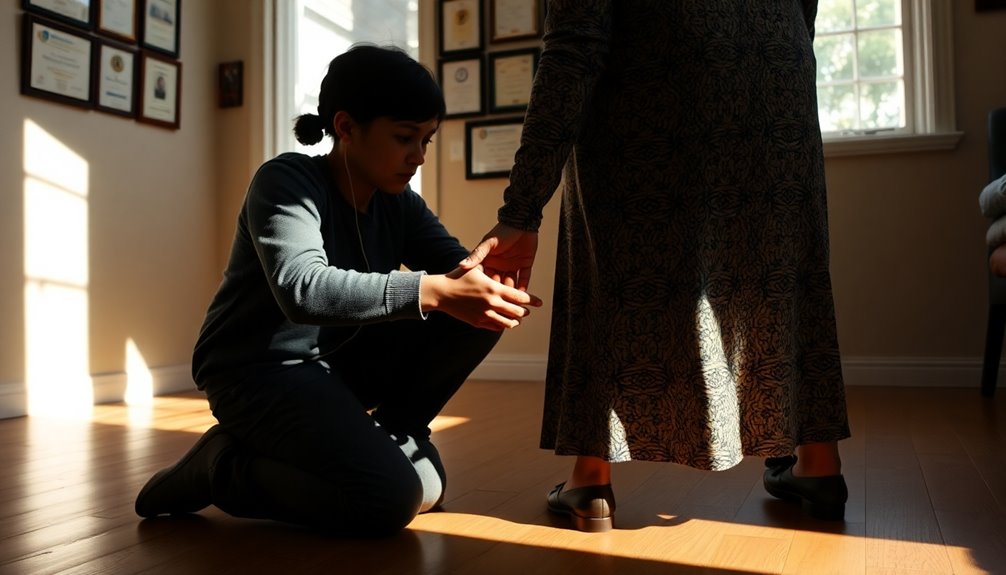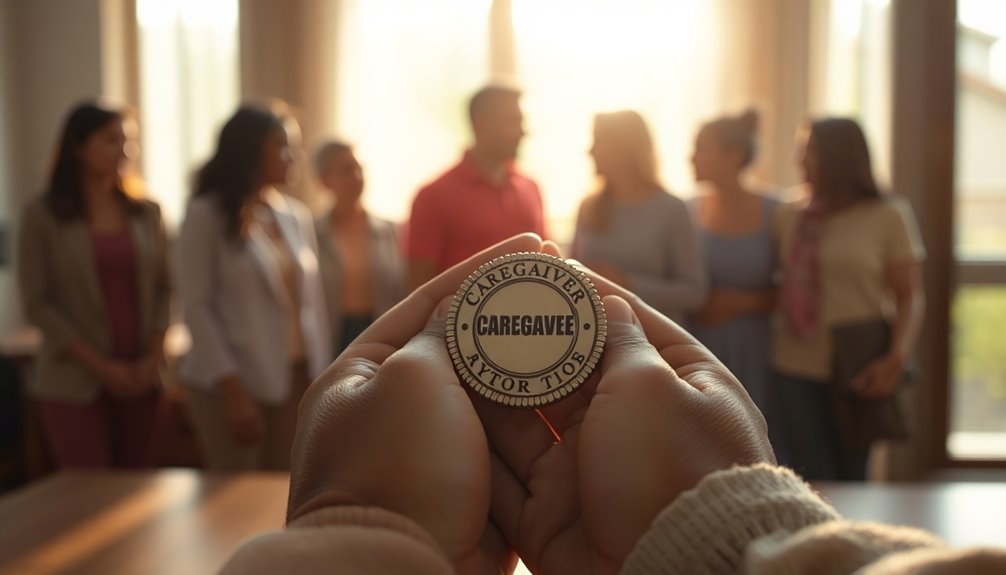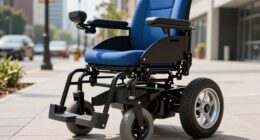Yes, you can be a caregiver with a felony, at 17, or without a license, but it varies by state. Some states allow felons to work in caregiving roles, depending on the nature of the conviction. Being 17 might limit some job options, but there are entry-level positions available. If you don't have a license, obtaining relevant certifications like CNA can help. There are ways to navigate these challenges, and more information is available on overcoming them.
Key Takeaways
- Many states have varying laws regarding hiring felons as caregivers, with some allowing case-by-case evaluations.
- At 17, individuals may be eligible for caregiver roles, but age restrictions vary by state and employer.
- Certain felony convictions may disqualify you from caregiving positions, so it's essential to research your state's regulations.
- Caregiving positions often require specific training or certification, such as CNA, which may be necessary even without a felony record.
- Employers may consider your rehabilitation efforts; being upfront about your background and showcasing personal growth can enhance job prospects.
Understanding Caregiver Roles and Responsibilities

Understanding the roles and responsibilities of caregivers is fundamental, especially since they play an important part in enhancing the quality of life for those they assist.
Caregivers provide essential support with daily living activities, such as personal hygiene, meal preparation, and medication management. Different caregiving roles, like Home Health Aides and Nursing Assistants, require distinct responsibilities and may need specific training based on state laws.
Many states enforce background checks, as felony convictions can disqualify individuals from caregiving positions. Compassion, patience, and effective communication are imperative, especially when working with those who've physical or cognitive impairments.
In addition, caregivers must uphold client confidentiality and ethical standards to avoid legal repercussions and guarantee the safety of vulnerable populations.
State Laws Regarding Felons in Caregiving Positions

Maneuvering state laws regarding felons in caregiving positions can be complex, as regulations differ widely across the country.
Here are some key points to evaluate:
- Some states impose blanket bans on felons in caregiving roles.
- Specific felony convictions may disqualify individuals, while others allow case-by-case evaluations.
- Background checks can greatly impact employment opportunities for those with criminal records.
Understanding the specific state laws is vital for felons seeking caregiving positions.
Regulations can include waiting periods post-conviction or exceptions for certain offenses.
Be sure to research your state's guidelines to determine if you qualify for caregiving roles, as these laws can directly influence your chances of gaining employment in this field.
Overcoming Barriers: Challenges for Felons Seeking Caregiver Jobs

Steering the path to caregiver jobs can be intimidating for felons, especially when faced with considerable barriers.
Stringent background checks often disqualify you from valuable employment opportunities in caregiving positions. The stigma of a criminal record can make employers hesitant to hire felons, particularly in roles involving vulnerable populations.
Additionally, state laws may impose blanket bans or disqualify individuals based on specific felony convictions, further complicating your job search.
However, support programs and legal aid services can help navigate these obstacles by offering resources and guidance on rehabilitation efforts.
Demonstrating completed training programs and showcasing personal growth since your conviction can considerably enhance your chances of securing a caregiver job, allowing you to contribute positively to society. Moreover, understanding the VA rating process for hearing loss can be beneficial for veterans seeking caregiver roles as it may improve their employability and support needs.
Pathways to Becoming a Caregiver: Training and Rehabilitation

While traversing the path to becoming a caregiver can seem intimidating, there are clear steps you can take to enhance your qualifications.
Focusing on training and rehabilitation can open doors to caregiving jobs, even for those with a felony record. Here are some effective strategies:
- Complete CNA certification through training programs to boost your employability.
- Engage in rehabilitation efforts by participating in vocational training that showcases personal growth.
- Utilize support programs that assist in maneuvering state-specific laws and job opportunities. Additionally, understanding the residency requirements in your state can be crucial for finding local caregiving positions.
Navigating Employment: Tips for Felons Pursuing Caregiving Opportunities

Finding a caregiving job as a felon can be challenging, but with the right approach, you can increase your chances of success.
Start by completing relevant training, like a certified nursing assistant (CNA) program, which shows your commitment to health care. Research employers known for inclusive hiring practices and target those opportunities.
Be upfront about your background during the application process, emphasizing your rehabilitation and personal growth. This honesty fosters trust with potential employers.
Additionally, gather character references and highlight any completed rehabilitation programs. These steps can greatly enhance your employability in caregiving roles, allowing you to overcome barriers that felons often face in the employment market.
Frequently Asked Questions
Can You Work in Home Health Care With a Felony?
Yes, you can work in home health care with a felony, but it largely depends on your state's laws.
Some states impose strict bans, while others allow employment after a certain period or with special approval. If you show evidence of rehabilitation and avoid disqualifying offenses, your chances improve.
Obtaining certifications like a Certified Nursing Assistant (CNA) can also help demonstrate your commitment to a professional path in caregiving.
Can a Felon Work as a Caregiver?
Did you know that over 600,000 individuals are released from prison each year in the U.S.?
If you're a felon, yes, you can work as a caregiver, but it often depends on your state and the nature of your conviction.
Many states allow you to pursue caregiving roles after a waiting period.
Completing training programs like CNA can boost your chances, especially with smaller agencies that might be more flexible regarding your background.
What Is the Best Job a Felon Can Get?
The best job a felon can get often depends on their skills and interests.
Entry-level positions in fields like construction, food service, or warehousing may be more accessible. You could also explore roles in personal care or home health, which sometimes offer more flexibility regarding background checks.
Focusing on trades or obtaining certifications, like a CNA, can enhance your employability and show potential employers your commitment to moving forward.
Can a Convicted Felon Work in a Nursing Home?
Yes, a convicted felon can work in a nursing home, but it depends on various factors.
Some states have strict regulations that might disqualify you, especially if your conviction is related to abuse or neglect.
However, if you can show rehabilitation or if your offense isn't relevant to caregiving, you might've a chance.
It's a good idea to look for facilities that are more lenient with hiring practices regarding criminal records.
Conclusion
In the world of caregiving, your past doesn't have to define your future. Even if you're 17, have a felony, or lack a license, there are still paths open to you. With determination and the right training, you can turn your life around. Remember, every cloud has a silver lining; there are employers who value your resilience and passion for helping others. Keep pushing forward, and don't let obstacles stand in the way of your caregiving dreams.









